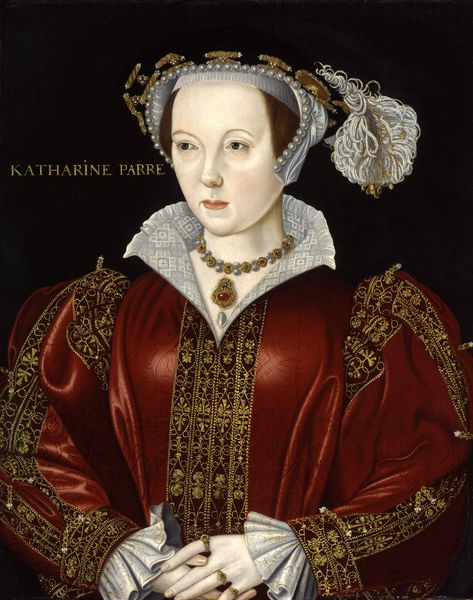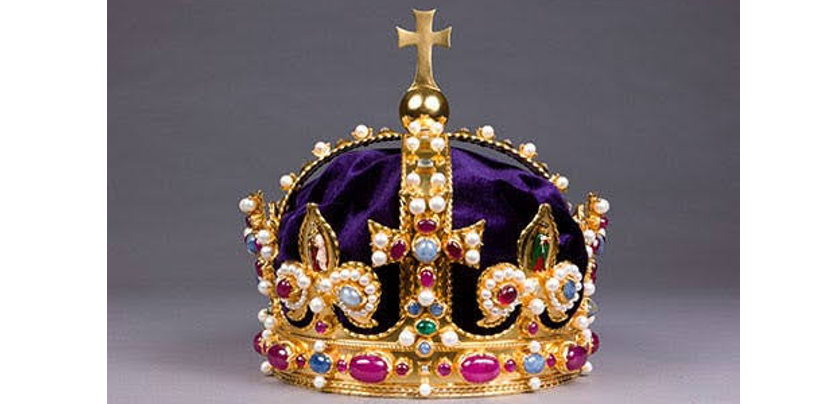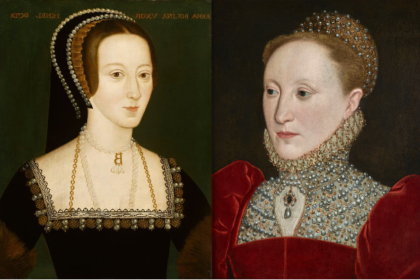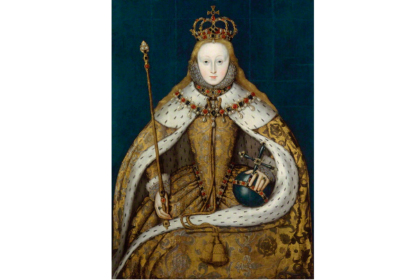This week I will, of course, be writing a lot about historical coronations. To kick the week off, though, I will start by discussing some coronations that never were – of the Queens Jane Seymour, Anne of Cleves, Catherine Howard, and Catherine Parr.
Henry VIII was crowned alongside his first wife, Katherine of Aragon, on the 24th June, 1509, and of course Anne Boleyn had her controversial coronation on the 1st June, 1533; so why were Henry’s subsequent wives so neglected in this area?
~
Expense
One significant factor that played a role in Henry’s avoidance of any more coronations was the expense. As today, Tudor coronations were very expensive. They had to reflect the majesty of the Crown and the King.
Although we don’t know precisely how much Anne Boleyn’s coronation cost, the Milanese ambassador estimated that it cost 300,0000 ducats; Henry paid 100,000, and the City of London paid the remaining 200,000.
In fact, at the end of June, 1533, Cromwell drafted a memo about the major expenses Henry had undertaken since Cromwell had joined his service. The last two items pointed out the cost of coronations and failed marriages: ‘He has borne most costly charge at the coronation of queen Anne. He has maintained the great and sumptuous house of the lady Catharine Dowager.’
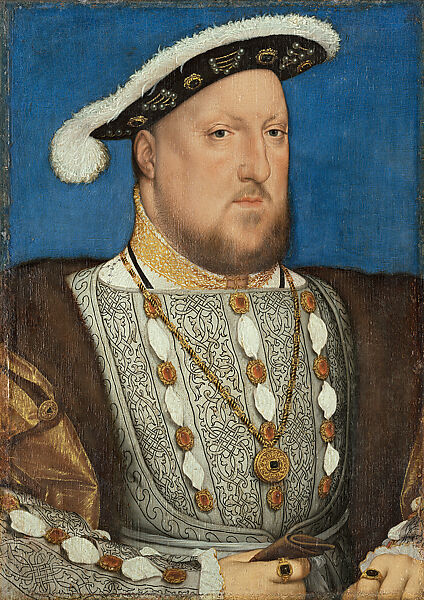
Unlike his father, Henry wasn’t the most fiscally responsible—one of the reasons behind the Dissolution of the Monasteries was the money he could get from selling off monastic lands—and it is quite likely he would have needed to seek Parliamentary approval for additional taxes to raise the funds for four more coronations.
Was Cromwell’s memo a subtle reminder that Henry would do better to save his pennies, rather than splurging on yet another coronation for a woman who had yet to show that she could provide an heir?
And yet, coronation preparations, and therefore expenditure, did occur at various points for Jane Seymour, Catherine Howard, and Catherine Parr.
Which brings us to perhaps the biggest reasons that we did not see any more coronations…
~
Pregnancy
Jane Seymour’s coronation seems to have been continually scheduled and rescheduled; although it was originally planned for Whitsuntide of 1536, shortly after Jane and Henry were married, but was put off until the Spring; indeed, as earlier as July 1536, Chapuys was reporting that a coronation would not take place as their were suspicions that Jane was barren. Thereafter, delay after delay occurred:
1 July 1536, Chapuys: ‘The coronation of this Queen has been delayed till after Michaelmas. Suspicious persons think it is to see if she shall be with child; and, if not, and there is danger of her being barren, occasion may be found to take another.’
8 July 1536, Husee: ‘The Coronation will not be till after All Hallow tide’
6 September 1536, Husee: ‘It is expected the Coronation will be on St. Edward’s day, unless the sickness stay it.’
15 September 1536, Lord Montague: ‘The coronation of the Queen will be the Sunday before Allhallow Day’
18 September 1536, Lord Chancellor: ‘Asks if the Coronation go forward at Hallowmass’
27 September 1536, Sadler: ‘After supper he (the King) returned to his chamber, sent for me, and said he had considered your letters, and, seeing how the plague reigned in Westminster, even in the Abbey, he was in doubt whether or not to defer the Coronation. He said, therefore, it were good that all his Council were here to consult on it’
3rd October 1536, Chapuys: ‘The Queen’s coronation which was to have taken place at the end of this month is put off till next summer, and some doubt it will not take place at all. There is no appearance that she will have children.’
31 December 1536, Husee: ‘Is told that there shall be a parliament at York and the Queen shall be crowned there’
5 January 1537, Archbishop of York: ‘Divers of my friends write to me, that both [the Parliament and Coronation shall be at [Yo]rke at Michaelmas next [to co]me, insomuch that my lord of Northfolche hath [told] one of my agents that I must make ready my … ce at Yorke’
8 January 1537, Robert Aske: ‘His Grace, for the love he bears to this country, intends to keep Parliament at York and have the Queen crowned there’
23 January 1537, Duke of Norfolk: ‘He has written more than I can perform, and his large sayings might be for a scant good purpose about the Coronation and Parliament, &c. As he was too sick to ride’
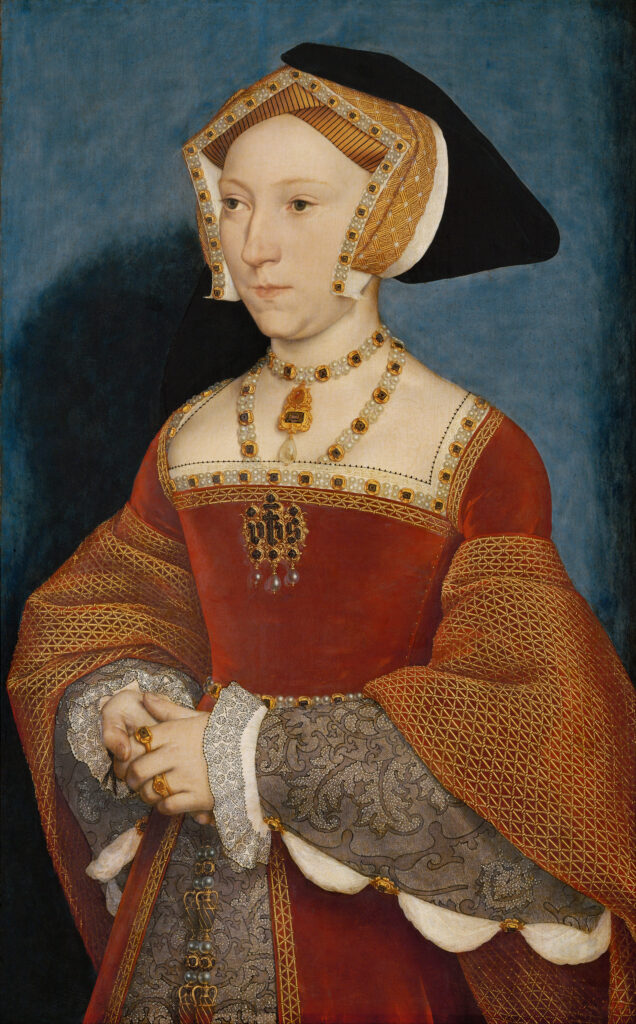
We can surmise that Jane became pregnant some time in February, which would account for why there were no more mentions of a coronation; after a long history of miscarriages, Henry would not have wanted to risk the strain of a coronation, and perhaps he even wanted to see that a son would be born, rather than another girl, before he committed at this late stage. Sadly, Jane died after fulfilling the King’s dreams of a son, but there is no reason to think that a coronation would not have been forthcoming.
For Anne of Cleves, whilst a coronation was originally scheduled, Henry had no intention of giving her the chance to fall pregnant, and her coronation was cancelled, which I will discuss further below.
With Catherine Howard, the topic of her coronation comes up in the sources at around the same time that ambassadors were reporting pregnancy rumours.
On the 16th September, 1540, the French ambassador, Marillac, wrote to Francis I that ‘…this King, who, by the programme of his journey, should have been already halfway back to London, is furnishing a great lodging of an old abbey, on which 1,200 or 1,500 workmen are night and day building, painting, &c., and adding tents and pavilions. Besides, he has had brought from London his richest tapestry, plate, and dress, both for himself and his archers, pages, and gentlemen, with marvellous provision of victuals from all parts. This seems to betoken some extraordinary triumph, like an interview of kings or a coronation of this Queen, which is spoken of to put the people of York in hope of having a Duke if she were to have a son.’
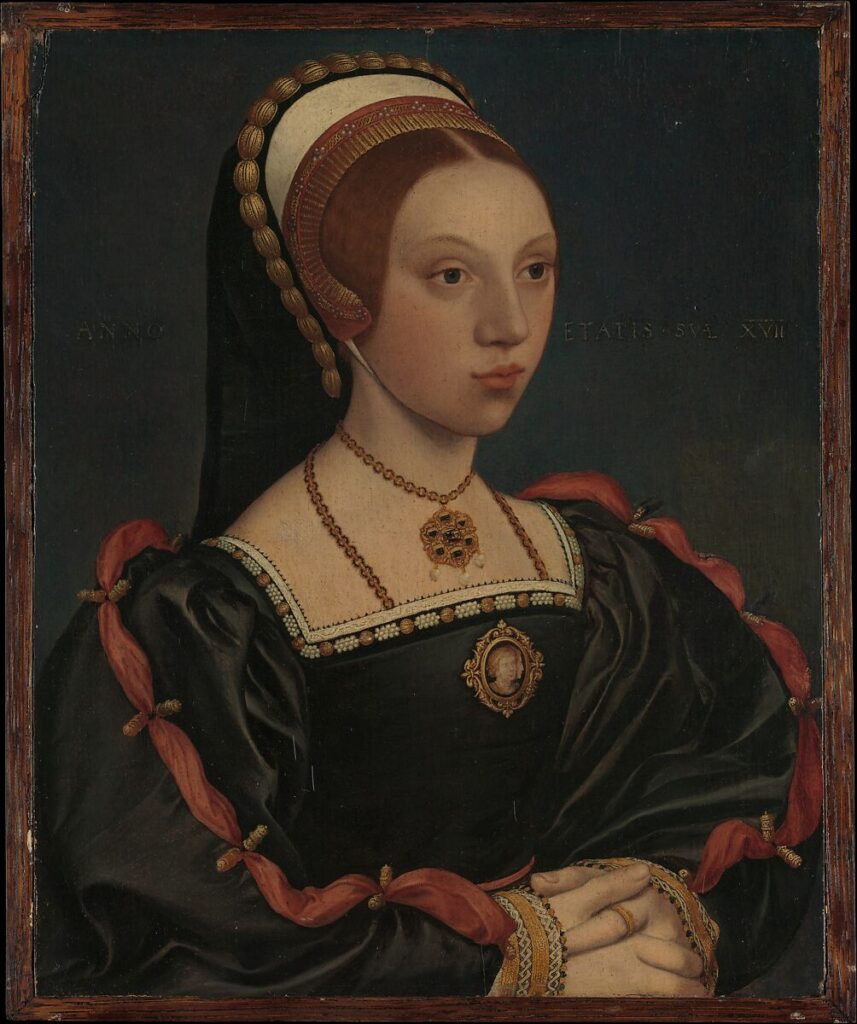
It should be noted that Marillac believed that a coronation was imminent; however though he clearly tied the coronation to the birth of an heir, Catherine, if pregnant at all, had yet to announce a pregnancy, which would take place only once she had felt the child ‘quicken’ in the womb. After so many miscarriages and stillbirths, would Henry proceed with a coronation before the birth of a child?
Marillac actually suggests a reason why he may do so in a letter written in March of the following year. When discussing the potential marriage of Mary, Marillac explains why the young woman had yet to be married off:
‘the main difficulty is to believe that the English would permit the lady to be placed so high that strangers might claim the Crown, on the pretext that she is heiress and the young Prince incapable of succeeding because born when the English were interdict from the communion of the Church, and his mother not crowned, which is already a scruple with the people.’
There seems to have been some concern that the fact that Jane had not been crowned could be used to disinherit her son. Of course, we know that Edward’s ascension was smooth, but then again, there was no truly viable alternative; Mary loved her younger brother and recognised his superior right to the throne, and she didn’t have a husband or son to push her claim.
10th April, 1541, Marillac once again wrote of pregnancy and coronation rumours: ‘…this Queen is thought to be with child, which would be a very great joy to this King, who, it seems, believes it, and intends, if it be found true, to have her crowned at Whitsuntide. Already all the embroiderers that can be got are employed making furniture and tapestry, the copes and ornaments taken from the churches not being spared. Moreover, the young lords and gentlemen of this Court are practising daily for the jousts and tournaments to be then made.’
In both instances, the coronation preparations both subsided along with the pregnancy rumours.
Although Henry’s Will did take into consideration a pregnancy with Catherine Parr, few seemed to have had any expectation that she would bear a child, nor that there would be a coronation, as I discuss further down.
Of course, giving birth to a son (and surviving) would have almost guaranteed that Henry would have proceeded with a coronation ceremony, publicly elevating the status of his queen and mother of his child.
~
Status
Whilst the issue of status goes hand-in-hand with pregnancy, it was more complicated than that. By delaying and avoiding crowning his wives, Henry was deliberately reducing their status. Throughout the Middle Ages, the custom had been that the consort of a king would either be crowned alongside her husband, or at the earliest possible convenience, depending on whether the marriage took place before or after the said king ascended the throne. Henry VII broke with this tradition, delaying the coronation of his wife, Elizabeth of York, by 22 months. Elizabeth had an inarguably better blood claim to the throne than Henry VII; by delaying her coronation, Henry was sending a clear message that he was King in his own right, not by right of his wife, and ensured that Elizabeth was not seen as the source of his power. Similarly, by not crowning his later wives, Henry VIII ensured that their status remained reduced, at least until their worth was proven, i.e., through the birth of a son.
It was also about control. During the ceremony, a queen consort is, like a king regnant, elevated as one of God’s appointed; the anointing with holy oil is a powerful and transformative moment of the coronation ceremony. As Henry saw when he separated from Katherine of Aragon, this was not something that could just be undone in the eyes of the people; to them, once a queen, always a queen. When he married and crowned Anne Boleyn, Henry believed that this was his one true love, the woman God had chosen for him, who would give him, and England, an heir. But twice burned, forever shy. By not crowning his later wives, he retained a much greater control over their status.
Anne of Cleves would perhaps have been an exception to this. Significant plans were in place to have her crowned on Candlemas, in February, 1540. Her status as a member of the House of Cleves meant that refusing to crown her would have been an insult to Henry’s Germanic allies.
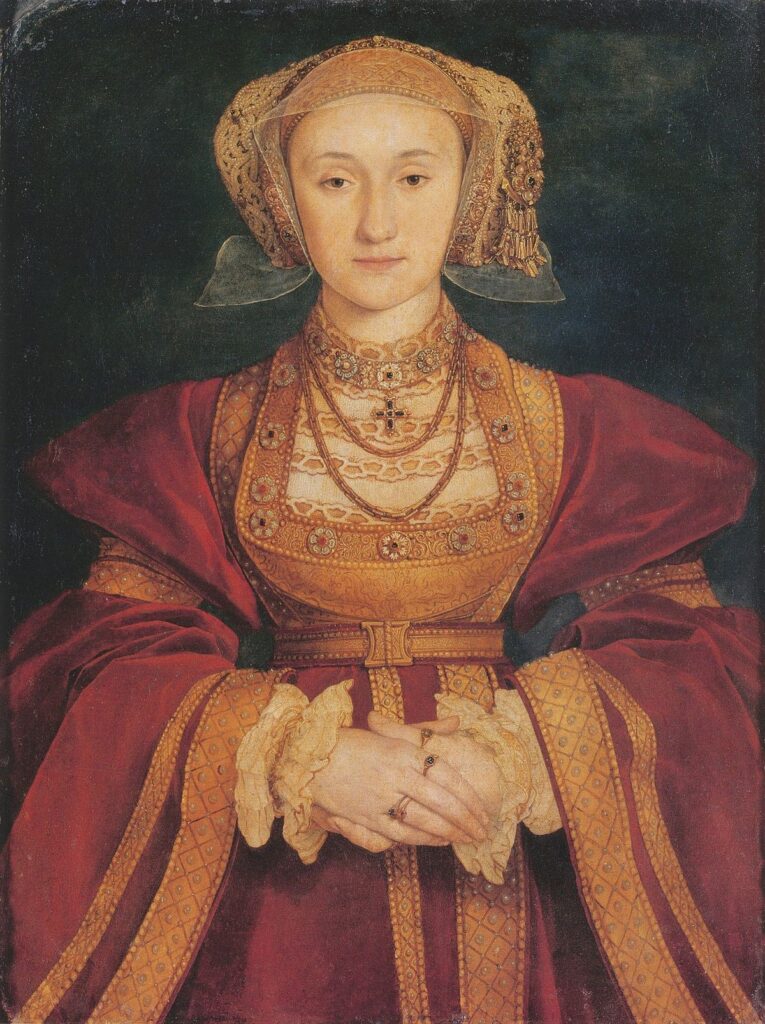
5 November, 1539, Marillac: ‘From Calais she shall cross to Dover, where the remainder of the lords of the Council will meet her and conduct her to Canterbury to the King, who, having there consummated the marriage, will bring her to London, to be crowned in February, as every one says, and as the preparations indicate’
30 November, 1539, Marillac: ‘On New Year’s Day they will pass through London, with every solemnity, to the King’s house at Westminster, where on Candlemas-Day she will be crowned. The King comes from Hampton Court to Westminster and will go to Greenwich, when he hears his Queen has crossed the sea.’
However, from almost the moment Anne stepped into his life, Henry decided he didn’t want to marry her. The traditional reasons given is that he was not attracted to her; however Heather Darsie very convincingly argues that the shifting political dynamics in Europe played a much larger role.
Whatever the reason, Henry knew he did not want the marriage to endure, and thus delayed the coronation whilst he found a way to get out of it. In late March/early April, there were rumours that the coronation would take place on Whitsuntide, a traditional date for coronations. Henry possibly used this as the excuse to delay the planned February ceremony.
26 March, 1540, Marillac: ‘These considerations, with the confidence they profess in Francis, make them give up all war preparations and turn their whole attention to the jousts, tourneys and pastimes they intend to make after Easter, before and after their Queen’s coronation, which shall be about Whitsuntide.’
8 April, 1540, Philpott: ‘You shall have money at my coming to Borbrowgh, which shall be against Whitsuntide, to furnish yourself against the Coronation’
10 April, 1540, Marillac: ‘These are the news. Nothing else is spoken of except the expected return of duke Philip of Bavaria to marry the lady Mary, and the jousts and pastimes at the Coronation at Whitsuntide.’
Henry’s other wives from this period were comparatively lowborn; they did not share Anne of Cleves’ royal status. There were no diplomatic consequences to avoiding a coronation. Arguably, when plans were being made to crown Catherine Howard in York, it was Northern counties and the King of Scotland who were being shown a signal honour, rather than Catherine herself.
~
Ill Health
Finally, Henry’s ill-health played a large role in Catherine Parr’s lack of a coronation. Historians note that from 1536, Henry’s health had been slowly declining, and the shock of Catherine Howard’s infidelity and execution had a profound impact on him. Though he had times of better health during his final marriage, such as when he personally crossed the Channel to capture Boulogne, during these periods he clearly had other priorities.
